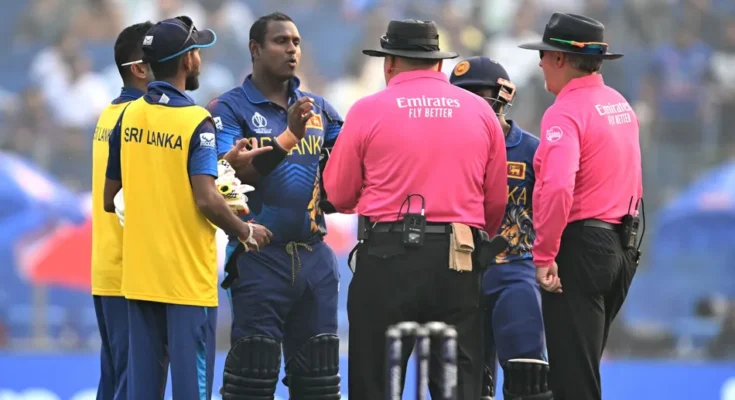Angelo Mathews was dismissed ‘timed out’ in the 25th over of Sri Lanka’s innings in their World Cup 2023 group stage match against Bangladesh in Delhi.
The former Sri Lankan captain walked into bat at No.6 after the fall of Samarawickrama’s wicket but returned to the dressing before even facing a ball – the first such dismissal in any form of international cricket.
Speaking after Sri Lanka had been bowled out and during the innings break, the fourth umpire Adrian Holdstock explained the law of “timed out” and how it affected Mathews’ dismissal.
“Firstly, I would like to mention that The ICC World cup playing conditions supersede the MCC laws of cricket when it comes to timed out,” explained Holdstock.
“At the fall of a wicket or even a retirement of a batsman now the incoming batter has to be in position to receive the ball within two minutes.”
The ICC Men’s Cricket World Cup 2023 playing conditions regarding the dismissal of timed out states that: ‘ After the fall of a wicket or the retirement of a batter, the incoming batter must be ready to receive the ball, or for the other batter to be ready to receive the next ball within 2 minutes of the dismissal.’
Mathews had taken ample time to arrive at the crease and then struggled with his helmet as the strap broke whilst he was taking guard. He then signalled to the dressing room for a replacement.
The Bangladeshi captain Shakib Al Hasan and his side then appealed to the on-field Umpires, Marais Erasmus and Richard Illingworth, who proceeded to adjudge Mathews to be dismissed ‘timed out’.
Mathews was then seen pleading his case with Shakib Al Hasan as well as several other Bangladeshi players and the umpires, but the appeal was not withdrawn, and Mathews had to walk back enraged.
Mathews then vented his frustrations by throwing his bat and helmet on the ground once he had exited the field of play and reached the Sri Lankan team dugout.
Holdstock further elaborates, “We have certain protocols as the TV Umpire at the fall of a wicket he basically monitors the two minutes, and he will then relay the message through to the on-field umpires.”
“In the instance this afternoon the batter wasn’t ready to receive the ball within those two minutes even before the strap being loose became an issue for him”.
Mathews then spoke in a post-match interview later on about how he felt regarding the incident whilst attempting to prove his case as well as making his feelings clear towards the opposition.
“I have two minutes to get to the crease and get myself ready, which I did, and then it was an equipment malfunction so I haven’t done anything wrong,” pleaded Mathews.
Mathews continued to speak but shifted the attention towards the evidence he had backing up his case as well as solidifying his stance on the Bengali team.
“See up to today I had utmost respect to him and Bangladesh team, obviously you know you all play to win and if it’s within the rules it’s fine. We have video evidence of my innocence, footage and everything was looked at so I’m not just coming and saying things here, I’m talking with proof.”
He then mentioned how player safety had impacted his actions as well as discussing the role the umpires had to play in the a situation that had never before transpired in international cricket.
“So, we talk about the safety of the players right. You guys tell me if it’s right for me to take my guard without my helmet on? It’s just pure common sense. That’s where I think the umpires also had a bigger job at the time because they could have also gone back and checked.”
It was the first time in international cricket, both men’s or women’s, that a batter was dismissed because of the “timed out” law despite it occurring on six other occasions in domestic cricket.



